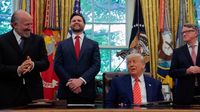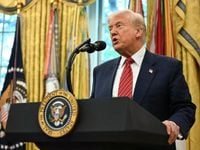United States President Donald Trump is poised to announce a significant trade deal with the United Kingdom on Thursday, May 8, 2025, marking a pivotal moment in his administration's trade strategy. This announcement comes on the heels of Trump's earlier hints about a deal with an unnamed country, which he teased on social media just a day prior.
In a post on his Truth Social platform, Trump wrote, "Big News Conference tomorrow morning at 10:00 A.M., The Oval Office, concerning a MAJOR TRADE DEAL WITH REPRESENTATIVES OF A BIG, AND HIGHLY RESPECTED, COUNTRY. THE FIRST OF MANY!!!" The news was subsequently reported by major outlets including The New York Times, The Wall Street Journal, Politico, and CNN, although it remains unclear whether the agreement has been finalized.
Investors are closely monitoring these developments, as many are eager for signs that Trump's trade war may be easing. The International Monetary Fund (IMF) recently lowered its global growth forecast for 2025 from 3.3 percent to 2.8 percent, citing concerns over ongoing trade tensions.
On May 6, 2025, U.S. and Chinese officials confirmed they would hold their first round of trade talks in Switzerland over the weekend, raising hopes for a potential resolution to the ongoing trade standoff between the two largest economies in the world.
While the UK has been spared from Trump's "reciprocal" tariffs that were announced against numerous countries last month, its exports have still faced a 10 percent "baseline" duty since April 9, 2025. The trade relationship between the U.S. and the UK is substantial, with the two nations engaging in £314.6 billion ($419 billion) worth of trade in goods and services in 2024, reflecting a 3.9 percent increase from the previous year, according to the UK’s Department for Business and Trade.
UK Prime Minister Keir Starmer recently announced the finalization of a "landmark" trade deal with India, which is expected to contribute £4.8 billion ($6.4 billion) annually to the UK economy. This context highlights the importance of the upcoming U.S.-UK trade agreement.
Trump's announcement on May 8 marks a significant milestone in his trade agenda. He paused his reciprocal tariffs on most nations last month, claiming that countries were eager to negotiate deals. The U.S. president has faced mounting pressure to demonstrate that his trade policies are yielding tangible results, and this announcement could be seen as a crucial step forward.
During the announcement, Trump celebrated the deal as "very big" and "maxed out," despite skepticism surrounding its overall significance. Under the new agreement, a universal 10 percent tariff on UK goods will remain, but tariffs on UK automobiles will be reduced from 25 percent to 10 percent. Additionally, the UK has agreed to eliminate the 25 percent steel tariffs imposed by the U.S.
In exchange, U.S. officials have secured billions of dollars in access for American agricultural products, including beef and ethanol. Trump indicated that future deals may not be as favorable for foreign nations, suggesting that the universal 10 percent tariff could be increased in subsequent negotiations. "The template of 10 is probably the lowest," he stated.
The strong historical ties between the U.S. and the UK have played a role in the negotiations. Trump has never imposed reciprocal tariffs on the UK, which may have facilitated this agreement. He praised the luxury automobile sector in the UK, highlighting brands like Bentley, Jaguar, and Rolls-Royce during the announcement.
Looking ahead, Trump hinted at numerous other trade deals in the pipeline but did not provide specific details. Treasury Secretary Scott Bessent informed lawmakers during a May 6 committee hearing that negotiations have already begun with 18 countries considered "major trading partners," excluding China. Bessent traveled to Switzerland on May 8 to meet with Chinese economic officials, marking a significant step in U.S.-China trade relations.
Despite the optimism surrounding these discussions, Trump expressed frustration over the persistent questions regarding the timing of trade deals. "I wish they'd stop asking how many deals are you signing this week," he remarked during a meeting with Canada’s Prime Minister. He emphasized that the U.S. does not need to rush into signing agreements, stating, "We don't have to sign deals. They have to sign deals with us. They want a piece of our market." This sentiment underscores the administration's approach to trade negotiations.
Regarding China, after Bessent's comments that the U.S. was not negotiating with China, a breakthrough appears imminent. The meeting in Switzerland could serve as the first step toward de-escalating the trade conflict, with Trump stating that tariffs on China are expected to decrease. "You can't get any higher, it's at 145, so we know it's coming down," he said.
Trump also acknowledged the potential impact of tariffs on American consumers, suggesting that families may need to buy fewer goods amid the ongoing trade disputes. He used the example of children's toys to illustrate his point, arguing that consumers might not need to purchase as many items as they previously did.
In announcing the 90-day pause on reciprocal tariffs, Trump noted that over 75 countries had reached out to U.S. officials to negotiate solutions regarding trade barriers and tariffs. His trade adviser, Peter Navarro, mentioned the possibility of finalizing "90 deals in 90 days" following the pause.
White House Press Secretary Karoline Leavitt previously stated that the administration had 15 trade deals on paper, later increasing that number to 18. With more than 100 countries expressing interest in trade negotiations, expectations are high that significant agreements will soon be finalized.
However, experts have raised concerns about the feasibility of Trump's ambitious timeline for completing multiple trade deals. The lengthy and complex nature of trade negotiations is evident in the administration's past experiences, such as the renegotiation of the North American Free Trade Agreement, which took over a year to finalize.
As the world watches the unfolding trade dynamics, the upcoming announcement with the UK signifies a critical juncture for Trump's trade agenda, with implications that could resonate across global markets.





